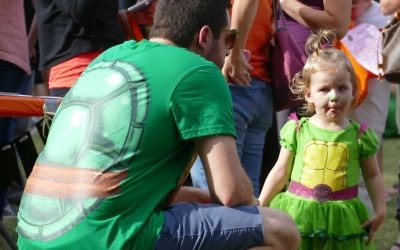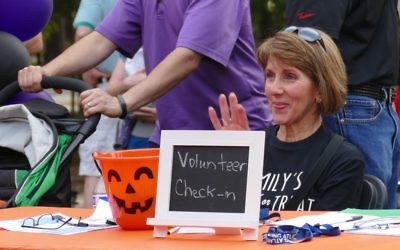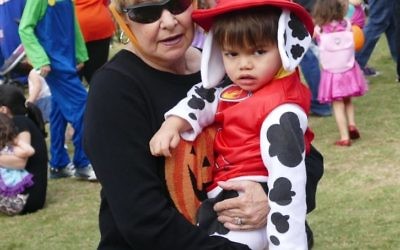Halloween Fundraiser Preserves Young Mom’s Memory
Community members gather to honor Emily Roffwarg Moore after losing her battle with cancer at 35.
Emily Roffwarg Moore was diagnosed with Stage 4 cancer on Halloween 2015. During the next 18 months the wife of Kurt Moore and mother of two young children endured misdiagnosis, surgery and a failed clinical trial before dying in March.
Just weeks after the 35-year-old’s death, her mother and three friends decided to honor Emily with a Halloween-themed celebration. Twenty-five volunteers, dubbed Em’s Crew, stepped forward to help with Emily’s Trick or Treat for a Cure.
“Halloween was a holiday she loved,” said Congregation Beth Shalom Executive Director Loli Gross, Emily’s mother.
On Oct. 22, 600 costumed children crowded into Dunwoody’s Liane Levetan Park at Brook Run for trick-or-treating at sponsored tables with candy and activities.
Photos by Michael Jacobs
Benefiting the Crohn’s & Colitis Foundation, the event raised nearly $40,000, and donations are still rolling in.
Emily was diagnosed with ulcerative colitis, an inflammation of the colon, at age 16.
Gross, described as a warrior by friends, said the group chose to benefit CCF because “we want a cure so that people don’t go through what Emily went through. Colitis didn’t define her because she was the kind of person who didn’t let anything get her down. You’d never know, and she was sick a lot of the time.”
Colitis is a debilitating disease often managed by a biologic agent administered intravenously. The drugs suppress immunity to everyday germs but keep colitis symptoms at bay. When one medication stops working because of allergy or resistance, patients are advised to try stronger and newer drugs.
After graduating from Dunwoody High School, Emily attended the University of Alabama, where she met her husband.
“I remember the first time I saw her at a fraternity (party). The girls were all dolled up. There was Emily in jeans and hiking boots. She was not a Southern belle. She was down to earth, very relatable,” Kurt said.
Emily managed her symptoms at Alabama and returned to Atlanta after graduation. Soon she and Kurt married and launched their careers. Morning colitis symptoms were rough for Emily, however, and she found that maintaining a work routine was difficult. She worked part time in marketing for Home Depot and later for Altman and Grubbs.
“I am a bigger personality than Emily, but she was a deeper person than me. She had strong friendships with a lot of people,” Kurt said.
Rachel Barr and Emily were like sisters, creating family traditions like an annual pumpkin patch visit and weekly taco night. Their second children were born within weeks of each other, as the women planned.
“We joked we should buy one big house together,” Barr said. “Our lives were one. We are one big family.”
Barr was pregnant with her third child when Emily found out she had cancer. Her first day of chemotherapy, Barr delivered a son and talked to Emily via FaceTime from the maternity recovery room.
Emily never complained, not even when she was being treated for cancer.
“She didn’t want people to feel bad for her or worry about her. Even her close friends may not know the extent” of her suffering, Barr said.
Stacy Rothberg met Emily many times over — at Camp Isidore Alterman at the Marcus Jewish Community Center, at Camp Barney Medintz, through mutual college friends — and the friends finally connected over their colitis diagnoses.
“There will always be good and bad days. Emily taught me that you have to laugh at this embarrassing disease. She always saw the silver lining. She was so positive about something that was consuming so much of her life,” Rothberg said.
The women were each other’s support group, discussing medication, sharing embarrassing moments and funny stories, and venting.
“She was my safe zone,” Rothberg said.
If Emily Moore was an excellent friend, she got it back twofold. Nearly 1,000 people attended her funeral, and 300 people attended shiva each night. Kurt has spent many Shabbat dinners with friends.
“If it wasn’t for (friends), some mornings I wouldn’t be able to get out of bed,” Gross said. “They check on me, asking to go out for lunch or in the evening. They have kept me going.”
“I’m OK. I don’t feel bad for myself or my kids; I feel bad for Emily. She was my best friend. She’s never going to be OK,” Kurt said. “If any good has come from it, it’s the support from the community.”
- What’s a costume party without Disney princesses making the rounds?
- Costumed creatures of all kinds collect treats while fighting Crohn’s and colitis.
- Emily Moore’s mother, Loli Gross, welcomes volunteers to the fundraiser.
- Costumed creatures of all kinds collect treats while fighting Crohn’s and colitis.
- Cheerleaders from Dunwoody High, Emily Moore’s alma mater, volunteer at the fundraiser.










comments